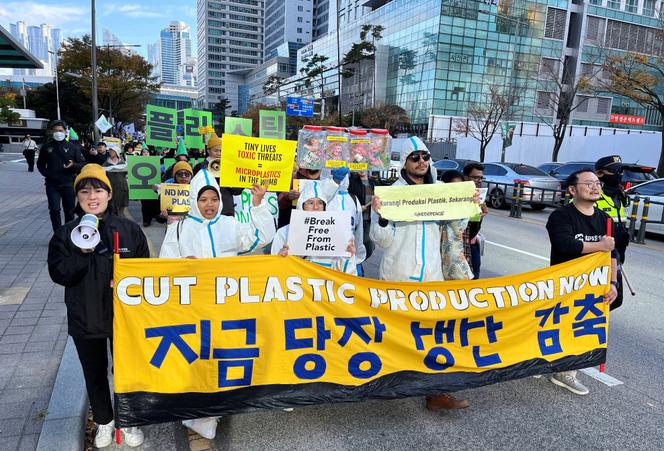


"It's like being at a petrochemical trade show!" Present in Busan, South Korea, for the latest round of negotiations toward a global treaty to end plastic pollution, Philippe Bolo, a French MP with the center-right MoDem party and author of several landmark reports on this "ticking time bomb," could not hide his astonishment. According to the International Center for Environmental Law, at least 220 representatives from the fossil fuel and chemical industries are accredited – more than the 191 representatives from the European Union and its member states.
Sixteen individuals have been identified within national delegations (China, Iran, Kazakhstan, Malaysia, Egypt, Finland and others). The powerful American Chemistry Council, which advocates for the interests of the chemical industry and particularly the plastics sector in the United States, sent no fewer than seven lobbyists to South Korea. American multinational corporations are also heavily represented, with five and four delegates, respectively, from the chemical giant Dow and oil major ExxonMobil.
British company Ineos, Germany's BASF and France's Arkema have each dispatched two representatives. In the corridors of the Busan Exhibition and Convention Center, lobbyists from Swiss food giant Nestlé and the European pressure group Plastics Europe are also present. The presence of petrochemical industry lobbyists has steadily increased since the negotiations began two years ago: 143 attended in Nairobi in November 2023, and 196 in Ottawa in April 2024.
"Allowing fossil fuel and petrochemical companies to exert their influence in these negotiations is like letting foxes guard the henhouse," said Von Hernandez, global coordinator of the international Break Free From Plastic movement. "Their oversized presence threatens to turn a critical environmental agreement into a charade, undermining serious efforts to curb plastic production and pollution." Bolo noted that "the interests of these companies are already well represented by the handful of countries that, under the guise of criticizing the form and substance of the debates, are in fact rejecting the very principle of an international treaty against plastic pollution."
With three days remaining before the negotiations conclude on Sunday, December 1, discussions continue to stall on the critical issue of plastic production. At the current rate, plastic production is projected to double by 2050, reaching 1 billion metric tons annually. A majority of countries, led by the High Ambition Coalition – which includes the European Union – support a treaty that sets reduction targets.
You have 52.07% of this article left to read. The rest is for subscribers only.
